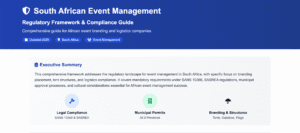Hosting an event can be an exciting and rewarding experience, but it can also be overwhelming and stressful without proper planning and preparation. If you’re wondering, “How do I start hosting an event?” in South Africa, this guide is for you. With the right approach, you can turn your passion for event planning into a successful venture. Starting an events company in SA can offer numerous opportunities, particularly given the vibrant culture and diverse range of events that take place across the country. By researching your target audience and understanding the local market, you can create memorable experiences that resonate with attendees.
Event hosting involves a series of steps, from conceptualization to execution. It begins with identifying the purpose and objective of the event, determining the target audience, and establishing a budget. Once these critical factors are in place, the next step is to start planning and coordinating the essential logistics, such as selecting a venue, arranging transportation, and choosing suppliers and vendors.
Key Takeaways:
- Event hosting involves a series of steps that require proper planning and preparation.
- The first step is to identify the purpose, objective, and target audience of the event.
- Creating a budget is critical to the success of any event.
Understanding Event Planning and Management
Event hosting is a complex process that requires careful planning, organization and coordination. A successful event requires the right balance of creativity, attention to detail, and logistical know-how. This is where event planning and management come into play.
Event planning involves the process of conceptualizing an event from start to finish. Event management refers to the implementation of those plans and the coordination of all the logistical details on the day of the event.
The event coordinator plays a crucial role in both event planning and management. This person is responsible for overseeing all aspects of the event, from determining the budget and selecting the venue to managing the event’s schedule, coordinating with vendors, and ensuring that all participants are engaged and satisfied.
The Key Responsibilities of an Event Coordinator
Event coordinators are tasked with a wide range of responsibilities to ensure that an event runs smoothly. These responsibilities can include:
- Developing a clear vision for the event and setting achievable goals
- Determining the budget and allocating resources effectively
- Selecting and securing a suitable venue
- Coordinating with vendors and suppliers, such as catering companies, sound and lighting technicians, and event planners
- Creating a detailed schedule and timeline for the event
- Managing the event’s registration process
- Ensuring that all participants are informed and engaged throughout the event
- Overseeing the setup and takedown of the event
Effective event management requires meticulous attention to detail, strong communication skills, and the ability to solve problems quickly and efficiently. An experienced event coordinator will be able to anticipate potential problems and develop contingency plans to mitigate those risks.
By focusing on careful planning and execution, event planning and management can help ensure the success of any event, big or small.
Event Logistics and Preparation
Hosting an event requires a great deal of preparation, planning, and organization. Proper event logistics can make or break the success of your event. It is important to create a comprehensive event checklist that covers all the logistical aspects of hosting an event.
| Logistical Aspect | Tasks |
|---|---|
| Venue Selection | Research and choose a suitable venue based on event size, location, and budget. |
| Budgeting | Create a detailed budget that covers all event expenses, including venue rental, catering, decor, and marketing/promotion. |
| Obtaining Necessary Permits | Ensure that all necessary permits and licenses are obtained for the event, such as liquor licenses for serving alcohol. |
| Creating an Event Checklist | Develop a comprehensive checklist that covers all logistical and operational aspects of hosting an event, from setup to cleanup. |
| Preparing Logistics | Plan and prepare all necessary logistics for a smooth event, such as setting up tables/chairs, arranging catering, and ensuring all equipment is in working order. |
It is important to stay organized and keep track of all the details in the planning and preparation process to ensure a successful event. By having a well-planned event checklist and a clear understanding of event logistics, you can ensure that everything runs smoothly and that your event is a success.
Hosting Tips for Event Success
Hosting an event can be challenging, but with the right hosting tips, you can ensure a successful outcome. Here are some key strategies to engage participants and make your event memorable:
- Plan Ahead: Effective planning is crucial for a successful event. Create a detailed timeline and allocate tasks to your team members to ensure you stay on track and keep everything organized.
- Promote Your Event: Create a buzz around your event by using social media platforms and online advertising to reach your target audience. Be sure to include key event information, such as date, time, location, and any special guests or activities.
- Engage with Your Guests: Make your guests feel special by offering personalized experiences, such as name tags and welcome gifts. Engage with them throughout the event by creating opportunities for networking and interaction.
- Create a Memorable Experience: Think outside the box and create unique experiences to set your event apart from others. This could include interactive activities, live entertainment, or delicious catering options.
- Gather Feedback: After the event, gather feedback from your participants to help improve future events. Use surveys or feedback forms to gather valuable insights on what worked well and what could be improved.
Remember, hosting an event can be stressful, but with effective planning and these hosting tips, you can ensure a successful outcome and leave a lasting impression on your guests.
Collaborating with Suppliers and Vendors
Effective collaboration with suppliers and vendors is key to successful event coordination and logistics management. To ensure that your event runs smoothly, you need to source reliable service providers, negotiate contracts, and establish clear communication channels.
1. Sourcing and Negotiating Contracts
When sourcing suppliers and vendors, it is essential to research the market thoroughly and compare prices and services. Prepare a list of potential service providers and request detailed quotes, outlining all the services and products included in the package. Negotiate contracts carefully, paying attention to terms and conditions, pricing, and payment schedules.
It is also important to establish clear expectations and deadlines, as well as contingency plans for unexpected events, such as cancellations or delays. A well-drafted contract can help to avoid misunderstandings and disputes, making the collaboration more productive and effective.
2. Communicating Effectively
Clear and timely communication is critical to collaborative success, especially in the lead-up to the event. Keep suppliers and vendors informed about the event’s schedule, logistics, and any changes or updates as they arise. Ensure that there is a designated point of contact for each supplier or vendor, who will be responsible for liaising with them and answering any queries.
Regularly discussing progress and performance can help identify any issues or risks early, enabling timely resolution and preventing potential disruptions. Encourage open and honest communication, and be prepared to provide feedback and support where necessary.
3. Building Strong Relationships
Building strong and long-lasting relationships with suppliers and vendors is vital for ongoing success. Develop a positive and respectful working relationship with each service provider, taking the time to understand their business, their values, and their strengths and weaknesses.
Show appreciation for their hard work and commitment, and acknowledge their contributions to the event’s success. Offer feedback and constructive criticism where appropriate, and be open to suggestions and ideas that could enhance future events.
By collaborating effectively with suppliers and vendors, you can ensure that your event runs smoothly, meets all expectations, and delivers a memorable experience for all attendees.
Overcoming Challenges and Problem-Solving
Event hosting can be a complex process with many moving parts and variables to consider. Despite careful planning and preparation, unexpected circumstances can arise and throw a wrench in your plans. To ensure a successful event, it’s essential to have a plan in place for problem-solving and overcoming challenges that may arise.
Effective communication is key when managing event logistics. Ensure that all team members and vendors are aware of their responsibilities and have a clear understanding of the event timeline. Regular check-ins can help identify issues early on and allow for quick adjustments to be made.
Preparing for the Unexpected
The best way to handle unforeseen circumstances is to have a contingency plan in place. This plan should outline potential issues and have solutions for each, such as identifying backup vendors or having extra supplies on hand. It’s essential to communicate this plan to all team members and ensure everyone is aware of the procedures.
During the event, it’s essential to stay calm and composed, even when faced with unexpected challenges. Assess the situation quickly and determine the best course of action. Don’t be afraid to delegate tasks to team members or seek help from vendors. Keep attendees informed about any changes and ensure they are comfortable and safe.
Assessing and Learning from Challenges
After the event, it’s essential to evaluate the challenges faced and identify areas for improvement. Gather feedback from attendees, team members, and vendors to gain insights and perspectives on what worked well and what could have been done differently. This feedback can be used to improve future events and enhance the overall event planning and hosting process.
Remember, challenges are a natural part of event hosting, and how they are handled can make or break the success of an event. By having a solid contingency plan in place and effective problem-solving skills, you can overcome any challenge and ensure a successful and memorable event for all attendees.
Evaluating Event Success and Gathering Feedback
Hosting a successful event involves not only careful planning and organization but also a thorough evaluation of the event’s effectiveness once it has concluded. By adequately evaluating an event’s success and collecting feedback from participants, event coordinators can identify areas of improvement and make necessary changes to enhance future events.
Measuring Event Effectiveness
Measuring event effectiveness involves evaluating whether the event’s objectives were met and determining the overall impact of the event. Some key factors to consider include attendance, participant engagement, and participant satisfaction. Event coordinators can gather this information through surveys, feedback forms, and social media analysis.
Gathering Valuable Feedback
Gathering feedback from participants can provide valuable insights into the event’s strengths and weaknesses. Some ways to gather feedback include offering online surveys, conducting focus groups, and reviewing social media comments. It is important to keep the feedback anonymous to encourage participants to share their honest opinions.
By effectively evaluating event success and gathering feedback from participants, event coordinators can continuously improve their events and ensure that future events are even more successful than the previous ones. Remember, a well-organized and memorable event can lead to long-lasting positive outcomes for both the participants and the organizer.
Conclusion
Hosting an event can be a daunting task, but with the right planning and execution, it can be a rewarding experience. From understanding the importance of event planning and management, to collaborating with suppliers and vendors, there are several critical aspects to consider.
As you prepare to host your event in South Africa, keep in mind that engaging your participants and ensuring their satisfaction should be a top priority. With effective marketing and promotion, thoughtful guest communication, and attention to detail, you can create a memorable experience for attendees and maximize the success of your event.
Remember to also evaluate the success of your event and gather feedback from participants, which can provide valuable insights for improving future events. With a positive mindset and a commitment to problem-solving, you can overcome any challenges that may arise during the event planning process.
We hope this guide has provided you with valuable information and inspiration for your event hosting journey. Now go out there, plan, and execute your event with confidence, and be sure to celebrate your success as you make a lasting impression on your attendees.
How Can Non-Profit Events Help in Uniting Communities in South Africa?
Non-profit events in south africa play a crucial role in fostering unity among communities. These events offer platforms where people can come together, bridge divides, and work towards common goals. Whether it’s a charity run or a fundraising concert, these gatherings bring individuals from diverse backgrounds to collaborate for the greater good. By promoting inclusivity and encouraging volunteer participation, non-profit events actively contribute to community cohesion in South Africa.
What Resources Do I Need to Start Hosting an Event in South Africa?
When planning an event in South Africa, it is crucial to consider the resources required for event in south africa. These may include a suitable venue, sufficient and experienced staff, necessary permits, audiovisual equipment, decorations, catering services, and transportation arrangements. These resources will ensure a smooth and successful event experience for both organizers and attendees. In addition to these logistical considerations, it is important to establish a clear timeline and budget to avoid any last-minute surprises. Knowing how to plan an event includes outlining each step of the process, from initial brainstorming to execution, ensuring that each aspect aligns with your overall vision. Engaging with local vendors and service providers can also enhance the experience, as they bring valuable insights into the specific needs and preferences of the South African audience.
FAQ
Q: How do I start hosting an event?
A: To start hosting an event, you will need to follow a few key steps. First, determine the purpose and objective of your event. Next, plan and organize the logistics, such as selecting a venue, setting a budget, and obtaining necessary permits. Then, create a comprehensive event checklist to ensure all necessary preparations are made. Finally, engage participants through effective marketing and promotion strategies and ensure a smooth event execution.
Q: What is event planning and management?
A: Event planning and management involve the coordination and organization of various aspects of an event. This includes tasks such as budgeting, venue selection, logistics preparation, marketing and promotion, guest communication, and overall event execution. An event coordinator plays a crucial role in ensuring all these elements come together seamlessly to create a successful event.
Q: What are some important event logistics and preparation considerations?
A: When hosting an event, it is important to consider various logistical aspects. This includes selecting a suitable venue that meets the event’s requirements, creating a budget and allocating funds accordingly, obtaining any necessary permits or licenses, and creating a comprehensive event checklist to ensure all preparations are made. Paying attention to these details will help ensure a smooth event execution.
Q: How can I engage participants and ensure event success?
A: To engage participants and maximize the success of your event, consider implementing effective marketing and promotion strategies. This can include utilizing social media, partnering with relevant influencers or organizations, and creating compelling event content. Additionally, ensure clear and timely communication with participants and strive to create a memorable and enjoyable experience for all attendees.
Q: How should I collaborate with suppliers and vendors?
A: Collaborating with suppliers and vendors is essential for successful event coordination and logistics management. Begin by sourcing reputable service providers and negotiating contracts that suit your event’s needs. Clear communication and regular updates with suppliers and vendors are key to ensuring all necessary arrangements are made and any potential issues are addressed promptly.
Q: What should I do to overcome challenges during event hosting?
A: Challenges are inevitable during event hosting, but with proper problem-solving strategies, they can be effectively managed. Stay flexible and prepared for last-minute changes or unforeseen circumstances. Have backup plans in place and communicate any alterations to your participants and team. By staying calm, adaptable, and proactive, you can overcome challenges and ensure a successful event.
Q: Why is evaluating event success and gathering feedback important?
A: Evaluating event success and gathering feedback is crucial for continuous improvement. By measuring event effectiveness, you can assess the impact of your efforts and identify areas for growth. Gathering feedback from participants allows you to understand their experiences, preferences, and suggestions for future events. Utilize surveys, feedback forms, and analytics to collect valuable insights that can inform your event planning and enhance future events.




